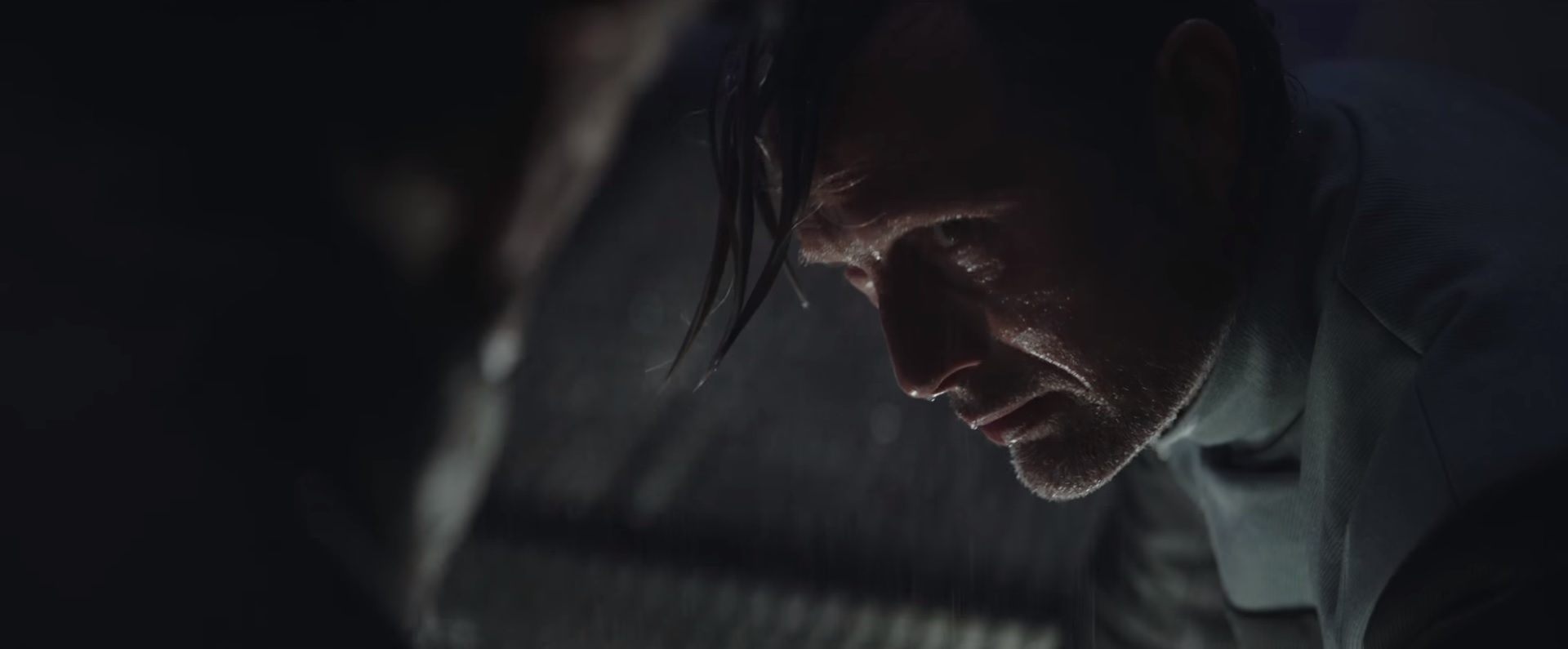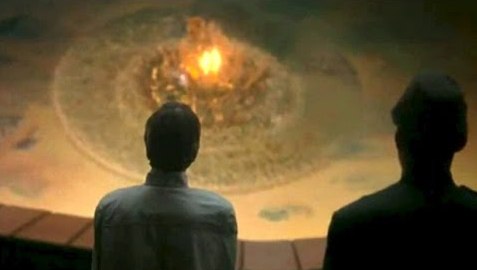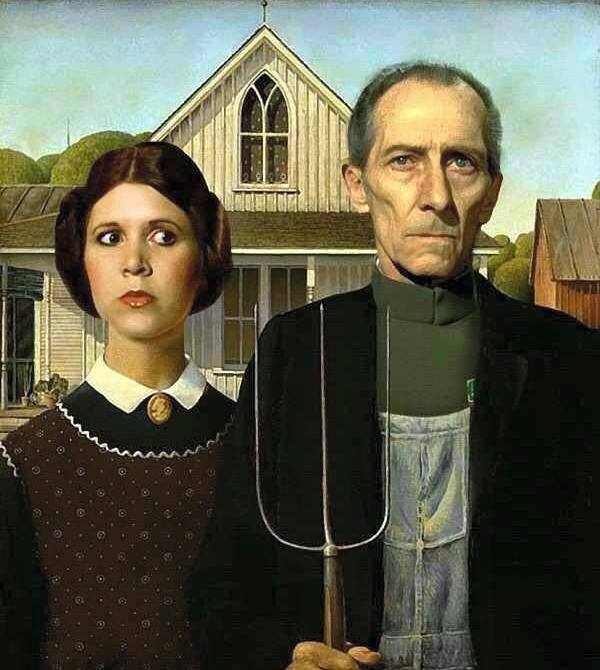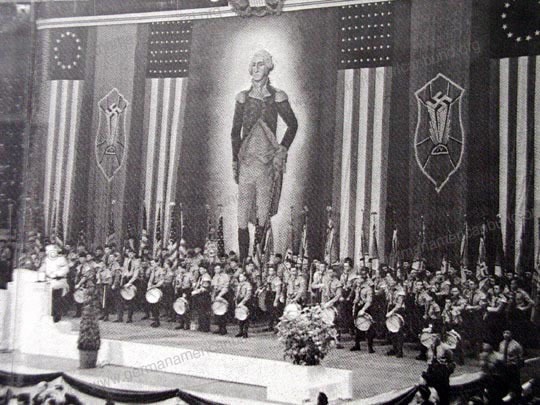Shabcast 29 – Wheelers Beware Girls Who Ask Questions
 The Shabcast is back.
The Shabcast is back.
Shana guests again, to talk about 80s fantasy cinema classics Return to Oz and The Neverending Story.
 The Shabcast is back.
The Shabcast is back.
Shana guests again, to talk about 80s fantasy cinema classics Return to Oz and The Neverending Story.
 Spoilers
Spoilers
Orson Krennic, director of the Death Star project, is a middle manager type who has achieved a position of authority above his abilities, possibly owing to his pre-existing relationship with engineer Galen Erso. He climbed the greasy pole owing to his association with a brilliant technician, and their partnership working on a prestige project. He’s ambitious and unscrupulous, but also essentially inadequate. He spends the entire film playing catch-up, being bounced between various superiors, looking for recognition, taking his frustrations out on others, and generally failing.
Tarkin’s attempted usurpation of Krennic’s control over the completed Death Star looks like a cynical power-grab, but could as easily be seen as a sensible management move. As Tarkin correctly notices, Krennic is not suited to a command role. In any case, Krennic’s shocked outrage is ludicrous given that this is just how the Empire works. His own successes come from appropriating the work of others, yet he has the temerity to feel aggrieved when his own work is appropriated. Moreover, the usual way you rise in the Empire is by showing more ruthless unscrupulousness than the other ambitious drones. You ‘work towards the Emperor’, and fuck over any competitors as you ascend. Then you get to preach against ‘ambition’ to those lower than you. It’s social-darwinism as a government system, and is yet another clear indication – and an unusually acute one – that the film sees the Empire as a clear analogue for Nazi Germany.
(The Nazi state was similarly based on this kind of wasteful infighting between multifarious bureaucrats with overlapping remits. And this was deliberate. It was doctrinal. Hitler believed the best way to get results was to set ambitious men against each other. Their epic pen-pushing battles over spheres of responsibility were supposed to mirror natural selection, the struggle for supremacy inherent in all life, or something.)
In Rogue One, it is strongly implied – in a flashback sequence of Jyn’s that adds nothing to the plot – that Krennic knew Galen and his wife, not only professionally but socially, before Galen fled imperial society. Krennic then spends years looking for him, to bring him back onto a project that could manage without him. The first thing he does, despite his stated intention of taking Galen’s wife and daughter alive, is to kill his wife. He hardly needs to, given the situation. Unable to find the daughter, he basically forgets about her. She’s out of Galen’s life. It’s fairly clear: Krennic wants Galen all to himself.
Despite claiming that Galen is a terrible liar, he allows himself to be fooled by Galen’s resigned-act for two decades. He has to be informed (in a roundabout way) of the obvious – that Galen is the traitor – by someone else. His refusal to see Galen’s treachery before then causes him all the career problems he spends the entire film coping with. Upon learning of Galen’s betrayal, he stages a public humiliation and punishment for Galen, killing everyone but him.…
 Yes, yet more Star Wars.
Yes, yet more Star Wars.
I still have a Patreon, as does Eruditorum Press (please give to the group before you give to me). And Wrong With Authority Ep 2 is still downloadable.
Note: This isn’t a ‘review’.
SPOILERS
As noted previously, Rogue One is a Second World War spy movie. This is probably why the Empire in Rogue One looks more explicitly Axis than ever before. And it was always pretty specifically Axis, with its Stormtroopers and its officers’ togs reminiscent of WW2 Japanese uniforms. But in Rogue One the Empire is placed specifically in the role of the baddies in a WW2 movie. I talked a bit about this last week, and Jane showed up in the comments to observe that Rogue One is also a Pacific Theatre movie, with its showdown in a beachy, tropical location, and its nukes.
The irony of the carefully scaled-down deployments of the Death Star is that their very comparatively small scale makes them spectacular in a way the destruction of Alderaan wasn’t. Alderaan just blows up. The city in Jedha, and the base on Scarif, are both destroyed locally, which means that the blasts can be observed from the point of view of the planet on which they occur. The result is, as Jane suggested, is something very visually reminiscent of the mushroom cloud, which itself – especially in this context – inevitably brings to mind Hiroshima and Nagasaki. As I myself noted in previous essays, Hiroshima and Nagasaki were always lurking in the series’ subconscious. Here they billow to the surface.
But there’s an obvious inference here. Hiroshima and Nagasaki were perpetrated by the United States. America remains the only country in history to ever actually deploy nuclear weapons – the ultimate indiscriminate killer, and therefore the ultimate war crime – against civilians as part of an actual conflict. Again, the implication of the US in the crimes of empire, of the twentieth century’s greatest horrors, has always lurked in the series. Here, again, it becomes more open than ever before. The scaling-back of the Death Star’s deployment makes the semiotic effect less bombastic, and hence less obscure. The Death Star becomes the Enola Gay, dropping Little Boy and Fat Boy on Jedha and Scarif. Consequently, the Empire is implicitly compared to the United States. Whereas before it has sometimes looked like the British Empire or the Confederacy, here it’s the USofA herself, and at the height of the good war and the greatest generation. More pertinently, it is the US at the historical moment when it became the world’s greatest superpower, which is another way of saying the world’s most powerful empire. This isn’t exactly coherent… you could certainly suggest that it looks like America attempting to put its own crimes onto the victims of those crimes… but sometimes incoherence is more eloquent. There is as much power in the implied association as in any implied victim-blaming, especially when you consider that there are other ways in which Rogue One flirts with implying quite a strong critique of US imperialism.…
 Welcome back to Eruditorum Press: A Star Wars Blog (apparently).
Welcome back to Eruditorum Press: A Star Wars Blog (apparently).
Some notes before we start.
Firstly, I still have a Patreon, and I send life-changing good vibrations through the ether to all those people who contribute to it.
Secondly, episode 2 of Wrong With Authority is still downloadable, here.
Thirdly, this post coincides (purely accidentally) with an excellent piece about Rogue One posted yesterday at Storming the Ivory Tower by Sam Keeper. Here. I strongly recommend it.
Fourthly, I may be dishing up something more substantial about Rogue One myself soon. It’s an interesting movie.
Finally, please forgive me if what follows is a bit sub-par. I’m really quite ill at the moment.
Oh, and SPOILERS
The alt-Right and MRAs and MGTOWs etc have a point about Star Wars these days. They say all the new Star Wars films are part of the cultural Marxist/white genocide/misandrist conspiracy against straight white men and the Right. They’re wrong about that, of course… though it certainly is nice of them to admit – in the manner of Fox News labelling some wallscrawl reading “NO FASCIST USA” as ‘anti-Trump graffiti’ – that they, and the version of straight white maleness they prize, are essentially identical with “the evil GALACTIC EMPIRE” (as the opening crawl from Star Wars describes it). But yeah, I for one certainly walked out of Rogue One wanting to go and kill fascists. Of course, I feel like that most of the time, so that makes it hard to judge how much of it was down to the movie.
But there’s no denying that the film at least clearly thinks, and openly says, it’s about a brave, multi-ethnic band of rebels, some of them explicitly the denizens of a world occupied and looted by foreign imperialism, led by a woman, killing loads of space fascists and giving their lives to help destroy space fascism. It doesn’t just think and say it’s about this… unlike many fantasy films which are under the impression that they have an uncompromisingly anti-fascist message, this one makes a good case for itself. It’s claims for itself are fairly convincing.
Rogue One is, of course, a massive exercise in nostalgia and pastiche. It is as much a ‘structre’ (the spectre of a structure) as The Force Awakens (see here). I won’t go into this in huge detail. There is something interesting in the way Rogue One deliberately gets everything slightly ‘off’. Even as it slavishly aims for aesthetic continuity with Star Wars, to the point of designing itself to be satisfyingly watched immediately before Star Wars, it nevertheless deliberately leaves out all sorts of key elements. There’s no opening crawl; there are no wipes. The film is very consciously not positioning itself as fantasy, as a pastiche of Flash Gordon the way the original did. Instead, Rogue One is self-consciously Star Wars as a war movie, very specifically a World War II spy movie. In its original form, the heroic group of titular rebels would all be played by Richard Burton and Richard Harris, etc, and Krennic would report to Donald Pleasance’s Himmler instead of a CGI Cushing as Tarkin. …
 Bit of business to take care of…
Bit of business to take care of…
Firstly, yes I’m the Friday guy now.
Secondly, I have a Patreon now, so if you like my stuff, and have some cash to spare, then you know what to do. Now. A few discerning people have already done it, or promised to, and you should copy them if you want to look cool and hard and clever. My patrons already have exclusive access to two pieces of my fiction-writing. Form an orderly queue, fans.
Thirdly, Episode 2 of Wrong With Authority is up. It’s a new(ish) podcast about movies that claim to be based on real history, and features myself, the laconic James Murphy, the leonine Kit Power, and Daniel Harper, who possesses no qualities beginning with ‘L’. We take it in turn to pick films and host episodes. This episode is Daniel’s, and it’s about two Oscarbait biopics of mathematicians, A Beautiful Mind and The Imitation Game.
Finally, ‘Xenomorph’s Paradox’ is a series about Alien and its various progenitors, progeny, parasites, predators, paratexts, para-phenomena, and paraphernalia. As some of you will know, I’ve been planning it for a long time. This post doesn’t necessarily mean the series is about to kick-off in full. But recent events prompted at least one installment. Things that have now retroactively become part of the series may be found here and here.
Harry Potter actor John Hurt has died. That’s how some news sources announced it. And that’s fine. I’m not here to sneer at that. For a generation, John Hurt was, first and foremost, Ollivander the wand-maker. And it’s not hard to see why. Hurt’s cameo is one of the most interesting spots in that first Potter film.
There’s a very real sense in which the film treats Hurt like its trump card. His appearance is given great weight. Harry walks into a mysterious, empty shop. There’s nobody about. He calls out. No answer. Then Ollivander slides into shot from nowhere on a rolling library ladder. The ladder is attached to shelves full of boxes of wands, immediately likening wands to books.
Ollivander is, from the start, the guardian of hidden knowledge.
Ollivander is one of the most interesting characters in the first book, because – unlike almost everyone else in it – he is allowed ambiguity. His ambiguity, moreover, is not connected to any plot point. It doesn’t mean anything in Rowling’s whodunnit structure. It has no payoff. It’s just there to be an interesting ambiguity. Ollivander is genial, amiable, helpful, and Harry is not sure he likes him. Harry, who normally strongly likes or dislikes people immediately, and is almost always proved right, isn’t sure about Ollivander. And this is left open, until Rowling retrofits some more content onto it in later books. But even this retrofitting doesn’t resolve Ollivander one way or the other.
Ollivander’s view of things is one that is not known about, shared, believed, or understood by almost anyone else. Without getting bogged-down in details, Ollivander turns out to be a devotee of occult knowledge, of hidden knowledge about wands, and of lore and myth and legend about a secret, counter-history of magic.…
 This is the final part of ‘Faeces on Trump’… which now seems a peculiarly poor title for this series… all the worse for being so nearly right. Still, I daresay I shall have more to say about Trump and related issues in the years to come (if I’m spared). But this first line of thought draws to a close. This post is, as a result, a kind of ‘summing up’. (God, I sound pompous, don’t I?) Further thoughts, or lines of thought, will have to stand alone from now on – and so I’ll be able to retitle for more relevance when I arrogantly shit them all over the internet, as if my opinion matters. But anyway, this is the last squirt of diarrhea from the bellyache that Trump’s victory gave me. Further dyspepsia will doubtless cause more and different effluvia to rain down upon you, because clearly I can’t help myself. (And you’re not even paying me!) Watch this space, you poor doomed motherfuckers.
This is the final part of ‘Faeces on Trump’… which now seems a peculiarly poor title for this series… all the worse for being so nearly right. Still, I daresay I shall have more to say about Trump and related issues in the years to come (if I’m spared). But this first line of thought draws to a close. This post is, as a result, a kind of ‘summing up’. (God, I sound pompous, don’t I?) Further thoughts, or lines of thought, will have to stand alone from now on – and so I’ll be able to retitle for more relevance when I arrogantly shit them all over the internet, as if my opinion matters. But anyway, this is the last squirt of diarrhea from the bellyache that Trump’s victory gave me. Further dyspepsia will doubtless cause more and different effluvia to rain down upon you, because clearly I can’t help myself. (And you’re not even paying me!) Watch this space, you poor doomed motherfuckers.
Fuck it, let’s not bother with any more piss jokes. Let’s have some Lenin. We might as well, in a world in which making a Ghostbusters film with a female main cast is enough to get you called a Marxist:
Bourgeois democracy, although a great historical advance in comparison with medievalism, always remains, and under capitalism is bound to remain, restricted, truncated, false and hypocritical, a paradise for the rich and a snare and deception for the exploited, for the poor… [D]eceit, violence, corruption, mendacity, hypocrisy, and oppression of the poor is hidden beneath the civilized, polished, and perfumed exterior of modern bourgeois democracy.
– Lenin, from The Proletarian Revolution and the Renegade Kautsky (as quoted by Cliff in Volume 2 of his biography of Lenin)
Paul Foot put that quote up over his office door at the Daily Mirror – where he worked before Robert Maxwell was allowed to take it over so he could bust the unions – just, in his words, “so there could be no doubt about where I stood”.
Even so, Foot wrote an entire book – and a very good one, which I recommend – about how great the The Vote was, and how many people had to struggle so hard and for so long to get it. Arguably, Foot under-stresses the extent to which the vote has not just been betrayed (by Labour) or undermined, but also repurposed as part of a system of consent to continued capitalist rule. You have to remember that huge numbers of working people thought of universal suffrage (however they defined it) as a means to fundamentally change society in favour of working people, including redistributing wealth and property. This ultimately didn’t happen, obviously… or rather, it did, but the wealth and property were redistributed upwards. This is neoliberalism, and a vital part of how it works is the repurposing of popular democracy, more than just its subversion. You could even say that neoliberalism is the great expression of that repurposing. Neoliberalism, as a global system, is a direct – and, at the lower and earliest levels, consciously connived – counter-revolutionary response to the post-war social democratic era, which was itself an extemporisation on the part of the capitalist system, a survival strategy to appease a global rejection of the inequalities of the pre-war system.…
 Dedicated, with all awareness of the impudence and absurdity of doing so, but also with sincere love and respect, to the memory of John Berger.
Dedicated, with all awareness of the impudence and absurdity of doing so, but also with sincere love and respect, to the memory of John Berger.
In the new Preface he wrote in 2010 for a reprint of his 1975 book A Seventh Man, John Berger explained why, in some respects, the book was outmoded. It is a book of words and photographs – by Jean Mohr – about migrants. It was written, as Berger says, before a great many things happened which would profoundly alter the world’s political landscape. One of these things is, as Berger puts it, “the establishment of the global economic order, known as neoliberalism – or, more accurately, economic fascism”.
Not even in the remote vicinity of fucking about, was Berger, despite his customary elegance.
But it’s true, in very essential ways. Fascism is marked by one of the treasured tactics of the liberal or the reformist leftist. It is a ‘mixed economy’. One of the first things the Nazis did, when they were handed power by German bourgeois politicians, was to privatise lots of key manufacturing industries. Much as did Thatcher as part of the neoliberal counter revolution in Britain. This isn’t to equate Thatcher and Hitler, but to point out that neoliberalism is a version of a strategy also central to fascism. And yet, as is better known (thanks to the semi-coherent screeching on this subject from the contingent of pub bores and internet bloviators I am thinking of christening ‘the folk Right’), the Nazis also employed a policy of state direction of industry, and were ‘statists’ in other broader senses. But then, as many have pointed out, neoliberalism is not really anti-statist. It expands the state in key ways, even as – fascism style – it integrates state power with corporate power. The great early triad of neoliberalism was Thatcher, Reagan, and Pinochet. Pinochet’s Chile, supported by Thatcher, and helped into being by the US, was run as a kind of lab experiment in what has become known as neoliberalism. The opening of the state to corporate interests, and the subsequent transfer of what had been socialised wealth into private hands, with the brutality of all that being buttressed with direct state brutality, with the growth of state power in areas such as police repression and military spending. Military spending, once again, a key aspect of fascism.
Of course, in Euro-American culture, we say it isn’t fascism if white people aren’t in the camps. If white people aren’t being locked up for thoughtcrimes, aren’t being murdered by the state, then whatever it is, surely it isn’t fascism. Without for a moment wishing to deny or downplay the immense suffering of the victims of the Nazi holocaust, and of mid-20th century German imperialism more generally, it’s true that we reserve a special and unique horror for that particular form of aggressive and racist imperialism because it was committed against mostly ‘white’ people in Europe.
(Though we must always remember that the category of ‘whiteness’ is socially constructed, and is therefore permeable, malleable and manipulable.…
 So, farewell 2016. But don’t worry. Plenty of nasty shit is going to happen next year too.
So, farewell 2016. But don’t worry. Plenty of nasty shit is going to happen next year too.
Plenty of nasty shit went on this year, and has especially been going on since Trump was elected. Next year won’t be better. It’ll be worse. The question isn’t whether it’ll be worse (it will), the question is how will it be worse?
As many predicted, the most immediate danger is probably going to be the emboldening effect of Trump’s election upon the vast army of resentful bigots who – like bullies in every schoolyard – suddenly feel a lot braver in the shadow of the really big bully.
Moreover, despite apparently immediately falling prey to incompetence, lack of preparedness, and a tendency to prioritize the settling of scores with Republican enemies, the Trump team has managed to make some appointments, and moot more… and they range from the routinely scary to the frankly terrifying. One of the worst so-far, almost everyone seems to agree, is Steven Bannon, former head of crazed, ultra-reactionary internet rag Breitbart, online hub for white supremacists, anti-semites, misogynists, conspiracy theorists, and most fervid and febrile flavours of the ‘alt-right’. Bannon himself is every bit the distasteful specimen you’d expect from such a background. He’s another of the ‘fascists without a uniform’ who seem to be proliferating in Trump’s bloated shadow. As an indication of what Trump plans to do with his presidency, it’s pretty unmistakeable. He plans to surround himself with a cloud of extreme reactionary dogma, and at least sound PR notes centred on denying and denigrating progress, attacking womens’ rights, stoking white ressentiment and paranoia, feeding Islamophobia, smearing Black Lives Matter and any such movement, and relentlessly attacking anything that looks like ‘the Left’ to the kinds of people who think the new Ghostbusters film is a Marxist plot (it wasn’t, by the way… or at least, if it was, they forgot to tell me.)
However, to once again be pedantic and lay myself open to misunderstanding, I find it implausible that Bannon and Trump will be instituting a Nazi-style round-up of anyone to the Left of them into camps, or a new political police force to arrest people for questioning the regime.
What does worry me is the idea that, on the look-out for such things, people – and I include myself in that, because god knows I’m prone to missing important shit going on under my nose – miss the incremental ramping-up of what we might call ‘normal extremism’ to the point where ‘fascism’ becomes entirely obsolete, because the system simply no longer needs it. That is what I see starting here: the beginning of a final burst of speed for normal extremism as it sees the victory line in the distance. The contours of fascism return as normal extremism speeds up. People notice the increase in speed and ferocity, but fascism as we have known it fails to appear. But before anyone notices, every function fascism has historically played in the service of capitalism – the burying of the left, the smothering of resistance, the disempowering of the working class, the slavish servicing of the needs of big capital, the reinforcement of the hierarchies of race and gender that capitalism finds so conducive to stability, the ruthless imperialism in the service of domestic capital, etc – can be achieved without fascism.…
 Title says it all really.
Title says it all really.
This time I’m joined by EP’s ‘new recruits’ from 2016, Josh, Shana & Daniel.
We don’t actually talk that much politics, so this is a relatively safe space if you’re trying to self-care a bit over the holidays.…
 “And that’s what he’s been like for forty-five years. Fantastic! Speeches that go on for four, five, six, seven hours… I wonder if when he gets to 90 he’ll stop and say ‘But that’s enough about me… let’s talk about you’.” – Mark Steel, 2001
“And that’s what he’s been like for forty-five years. Fantastic! Speeches that go on for four, five, six, seven hours… I wonder if when he gets to 90 he’ll stop and say ‘But that’s enough about me… let’s talk about you’.” – Mark Steel, 2001
So, as you might have heard, Fidel Castro died. Aged 90. Ruler of Cuba since the revolution of 1959, which he led, and which unseated Batista. Something something survived x many US Presidents something something Che Guevara something something Bay of Pigs something something…
…aaaaaand at this point we would normally go into a recitation of certain obvious points. Different points depending on the political orientation of the writer, his publication, etc.
For the Right, we would recapitulate that Castro was a dictator, that there is little democracy in Cuba, that it’s a one-party system, that post-revolution Cuba has a dismal human rights record, that dissidents are persecuted, that political prisoners are often ill-treated, that the regime cruelly persecuted LGBT people, etc.
Unusually for the Right, this is all true. They generally don’t have to lie about Cuba. They would if they had to, but they generally don’t need to. Not about the basics anyway. Which must be refreshing for them. (Actually I don’t think they give a flying toss.) They lie about the bigger picture, of course, characterizing Cuba as an exceptional abhorrence, while suppressing votes and supporting privatised slave gulags at home, and bombing Syria and cuddling the Saudi royalty and arming Israeli apartheid and invading Iraq, etc etc etc.
For the Left, we would probably stress the enormous improvements in education, literacy, health care, etc, which came from the revolution. We’d talk about Castro’s support for the ANC against South African Apartheid (in contrast to most Western governments) and for similar liberation struggles across the world, Palestine for instance. We’d talk about how bad Batista was (and he was a vicious dictator), about how pre-revolution Cuba was a playground for the US corporations and the mafia, about how badly the USA treated post-revolution Cuba (very badly), the hypocrisy of the West in condemning Castro when it snuggles up to friendly dictators (Pinochet, the Saudi royals, etc etc etc) and commits imperial atrocities itself, including multiple coups to put US-friendly dictators in charge of Latin American nations. We’d talk about 600-odd CIA assassination attempts, and exploding cigars, and so on.
Again, all true. Truer, perhaps.
Occasionally, you’ll get an article which mixes the two approaches in the name of nuance and balance. Even Owen Jones managed this basic feat. But even in such cases, the exercise is still in the mixing of two distinct approaches. (With Jones, the result was a classic case of ‘this, but on the other hand this’, followed by his customary moralising at the Left.)
And that’s the point. Both sides are more-or-less right about Castro and his Cuba. Maybe not in their ideological conclusions, but in their factual cases.
But very few commentators have stopped to ask why these two realities overlap.…